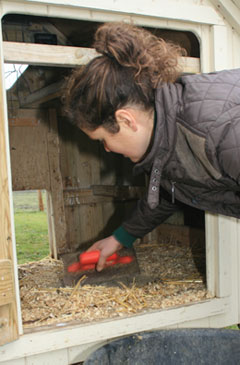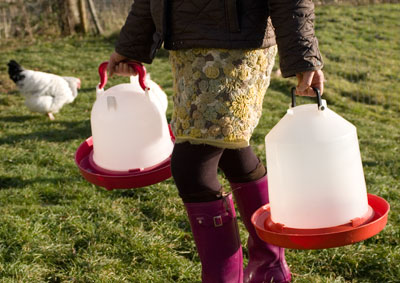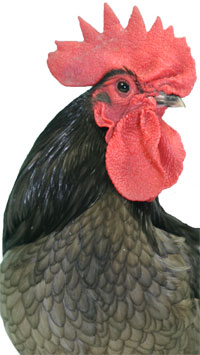Stress is a major contributor to ill health in chickens and can also make them more prone to a number of vices such as feather picking, egg eating, comb or vent pecking.
Chickens kept in intensive conditions are constantly subjected to stress which is why farmers see such high mortality rates and have to pay out to keep birds healthy and make them productive. Fortunately, keeping chickens in our back garden isn’t exactly intensive as long as they have a sufficiently large run or are let out of their run regularly to free-range although there are pleanty of other times when chickens can suffer from stress.
In short, stress is best avoided whenever possible and a little bit of care and forethought can dramatically reduce stress in your birds.
So how do we know what stresses chickens? Well, some years ago, there were studies done that measured the stress hormone ‘corticosterone’ of birds in different situations and it is this research that has enabled us to understand the stressors.
Stressors.
As well as intensive conditions causing stress, the other main stressors can seem quite trivial to us.
- Handling. This is one of the biggest stressors. Chickens are a prey species so naturally, if caught and picked up, they become stressed. Whilst regular handling is important for health checks, chasing a bird around a run for 5 minutes every time will not help. Try to catch birds in a confined area such as a house quickly and calmly. Hold the wings firmly and then transfer the bird to the holding position with your right hand underneath her, breast in the palm of your hand, fingers holding the tops of the legs. Her head should be underneath your arm so her head is looking behind you. Use your left hand to examine her.
- Introducing new chickens. Chickens are flock animals that have a pecking order. It is thought the ancestors to our chickens, the Red Jungle Fowl of South East Asia use the pecking order to assist in their survival. If every bird has her place, when it comes to feeding time, each one can have her turn and they don’t have to spend precious time arguing which may alert predators to their where-abouts. Every hen knows her place in the pecking order and by introducing new birds, the pecking order is upset. No hen knows where she stands and this will cause arguments and considerable stress for days until they have sorted themselves out into a ‘new flock’.
- Lack of food or water. This stress is completely avoidable of course but we all have those one off days when we suddenly realise that our birds have run out of water for one reason or another. A leaky water container, frozen water or just a forgetful moment!
- Extreme heat. Chickens don’t sweat. To cool down, a chicken must either take on cool water (and excrete more to lose the excess fluids and some heat) or pant which removes heat through the air they exhale. Chickens are much better equipped to deal with the cold and can keep their body temperature up by eating more and trapping air inside their feathers to insulate themselves thermally. Heat will cause chickens to become stressed.
- A new environment. This can be taking a bird to a show, getting your birds for the first time or just moving them to a different house or run. Another environmental change that is hard to avoid but causes considerable stress for your birds is when there has been a covering of snow.
- Egg laying. This is surprising since this is a natural things that chickens do but egg laying does cause stress on your hens. Giving them a peaceful, private, darkened nest box can help. Try not to disturb hens that are in the process of laying.
- Predation. Foxes or other predators visiting the garden on a regular basis are likely to cause stress. In the extreme case, after a fox attack, even though a chicken may survive the wounds inflicted by a fox (he grabs a mouth full of her feathers for example and the chicken escapes), she can still die because of the stress.

If you can minimise stress, your birds will be less prone to picking up disease which is something we would all like: happy, healthy chickens!






I have one cochin hen that was given to me as it was found wandering in the road. I’m happy to keep her and have bought all the food and a lovely coop for her, however I do not wish to get another hen and people tell me she should have a friend as she will be lonely. I let her out each morning and she has the run of the garden until I put her away again in the evening. I don’t wish to get another hen as I understand they will ruin the garden. Will she be okay if she is an only hen?
Well chickens are flock animals and naturally they are used to living with others in small groups. Ideally she should have a friend.
sometimes the wanderers are the ones who get bullied by the hens in their flock. they wander to escape the others as they are the lowest in the pecking order. hens like these seem to be happiest on their own as they are used to it and feel safer. In this case I would leave her but makes sure that she has extr bedding in the winter as she will have no other hens to cuddle up with. she will become quite tame.
Morning am a little worried as one of my chickens, I have three, has been in the house in the nest box since Sunday (20th) afternoon and is still sitting in there this morning (21st) July. She doesn’t seem stressed, I have had them since april and she has never done this before.
It sounds like she has gone broody. You can take her off and keep her shut out until she comes out of it. There are various other methods on the internet (poultrykeeper.com has a good page on this) but if shutting her out is difficult because of other hens laying, you can also use a dog crate / cage on a cool floor in a shaded area such as a garage. Do not put bedding material down, just newspaper and provide her with water and food.
It is sometimes a little harsh but once she comes out of it in a few days, she will be able to get back to being a normal hen again which is much kinder in the long run than having her sit and run herself down for weeks on end.
Hi, need some advice please! I have had my 4 hybrid hens (started with 5 but mr fox got one when they were out free ranging) since September and have had no problems with them at all, however last week one of the bluebells started chasing and pecking the comb of my warren, after a few days of this and anti pecking spray being used a small bit of blood has been drawn on the back of her comb which I allowed to dry and covered with tar. The bluebell didn’t stop the attacks after 3-4 days so after advice have separated her into a crate out of sight, however my light Sussex has now picked up the lead on bullying my warren in the absence of the bluebell…
Following the fox attack I stopped the chooks free ranging and have kept them in their 3 x 9ft run which hasn’t seemed to create a problem for the past few months but I am wondering if it is boredom that has triggered the bullying? However I am out at work all day and whilst we have a secure garden the fox managed to jump our garden gate…
What can I do now to restore the peace and get my flock back living together?!
It does sound like boredom – there are many vices picked up when chickens are confined (in the extreme case look at the state of ex-battery hens!).
You can add various things to help boredom e.g. scatter their corn into the run substrate (wood chips?) and rake over – they can spend time scratching and finding this. Add a dust bath. Add greens such as cabbages hanging so they have to jump for them to reach them (exercise AND vitamins!).
Ideally I would try to let them out for a few hours before bed when you are around, but perhaps you could consider building them a larger run / enclosure in the long term.
You are doing the right thing separating them when blood is drawn.
Thanks for the reply.
I have bought some woodchip to put down and some cabbage to hang, I’m even going to try hanging CDs as I’ve seen a couple of people mention those as a good distraction for boredom on other forums.
How long should I leave my isolated bullying bluebell before returning her to the flock? It seems whichever hen I separate from my warren doesn’t seem to make a difference as another one takes on the bullying role, but I have to say the light Sussex is less persistent. Would I be better putting the bluebell back in with the flock and removing the warren for some rest bite? She doesn’t seem to have suffered anymore injuries but is constantly watching her back and not left alone for long but bless her she is still laying!
I haven’t got the biggest garden in the world but will look at getting an enlarged run for the long term.
It’s tricky to say exactly who to remove – I would remove the main bully until the injuries have subsided and ideally the flock has settled, then the bully will have an established flock to contend with when she’s returned but it’s never that simple if others are also bullying.
Essentially, I believe that if you give them more space and enrichment (the boredom busters we’ve discussed) you’ll see fewer problems.
I love my four hens and we have a smaller backyard to let them rome in but they never get board they are always finding new doller weeds to eat and they always seem to find there way into my garage !
I had 3 chickens. Unfortunately my dog jumped their fence and attacked them. One didn’t recover and died a few days later. At the time one of the other chickens was broody so was tucked away safely in her house. The third chicken was okay, had a few bum feathers missing but seemed to be coping well and continued to lay.
Now the broody chicken is no longer broody but looks awful, she has lost lots of feathers and looks like she has been spun in the washing machine and her comb looks dull. Since she came off the nest the other chicken has stopped laying. I haven’t had any eggs from her for about 10 days. The dog continues to bark at them but I have secured their fence so he can’t get in.
Do you think it’s the stress of the dog that is upsetting them both? Or is it a side effect of the broodiness? Or perhaps they are feeling the loss of their chicken friend?
I want to get a couple more chickens but don’t want to if it’s the dog that’s the bother.
I would really appreciate your thoughts
Thanks
They are possibly moulting early due to the stress caused by the dog attack but the dog being so close and barking at them is probably causing them a lot of stress too. I would try to keep the dog inside when you look after the hens so the barking behaviour can be prevented and keep the dog at a distance where he won’t bark when he’s out in the garden.